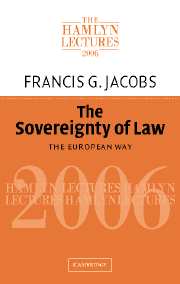Book contents
- Frontmatter
- Contents
- The Hamlyn Trust
- The Hamlyn Lectures
- Preface
- 1 Introduction
- 2 The rule of law in Europe
- 3 The European Convention on Human Rights and the rule of law
- 4 The European Union and the rule of law
- 5 Fundamental values
- 6 Courts and free markets
- 7 The European Union today: some achievements
- 8 The European Union today: some problems
- Afterword
- Index
6 - Courts and free markets
Published online by Cambridge University Press: 29 July 2009
- Frontmatter
- Contents
- The Hamlyn Trust
- The Hamlyn Lectures
- Preface
- 1 Introduction
- 2 The rule of law in Europe
- 3 The European Convention on Human Rights and the rule of law
- 4 The European Union and the rule of law
- 5 Fundamental values
- 6 Courts and free markets
- 7 The European Union today: some achievements
- 8 The European Union today: some problems
- Afterword
- Index
Summary
Here we turn to the European Community, and to economic issues: to the role of the European Court of Justice (ECJ). We shall consider the role of the courts in fashioning a free economy, and in determining its limits.
The approach of courts traditionally favours, here as elsewhere, the freedom of the individual: here, the freedom of the trader. The English courts historically regarded a restraint of trade as contrary to public policy. But what are the limits on that approach? What happens, especially, when free trade conflicts with other values?
The EC internal market
My first example is from the internal market, and serves to illustrate the role of the ECJ. It should be stressed at the outset that the internal market is about far more than free trade in goods and services, hugely important though they are; it is also about the free movement of persons, individual rights and the development of fundamental principles in that context, in particular the principle of equal treatment. Article 14 of the EC Treaty refers to the internal market as comprising ‘an area without internal frontiers, in which the free movement of goods, persons, services and capital is ensured’. This sector of the law has seen remarkable developments. But I will start with free trade in goods, the first substantive topic in the EC Treaty.
- Type
- Chapter
- Information
- The Sovereignty of LawThe European Way, pp. 97 - 120Publisher: Cambridge University PressPrint publication year: 2007



